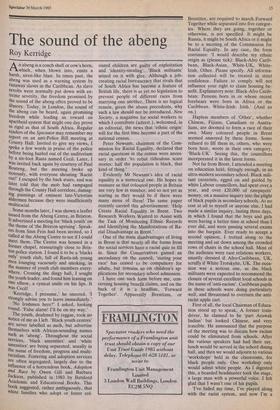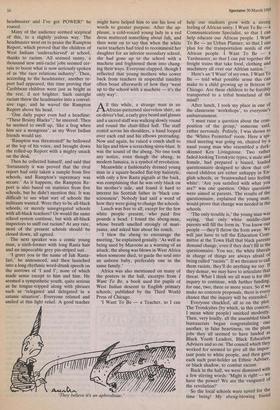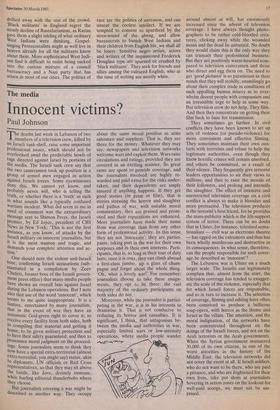The sound of the abeng
Roy Kerridge
A n abeng is a conch shell or cow's horn,
when blown into, emits a harsh, siren-like blast. In times past, the abeng was used as a warning system by runaway slaves in the Caribbean. As slave revolts were normally put down with ex- treme severity, the freedom promised by the sound of the abeng often proved to be illusory. Today, in London, the sound of the abeng can be heard, again promising freedom while leading us toward an apartheid system that might one day prove as rigid as that of South Africa. Regular readers of the Spectator may remember my report on an anti-Police Bill meeting at County Hall. Invited to give my views, I Spoke a few words in praise of the police before being hurled out of the auditorium by a six-foot Rasta named Cecil. Later, I was invited back again by courtesy of Paul Boateng, but the meeting broke up riotously, with everyone shouting 'Racist out!' I escaped by the back stairs, and was later told that the mob had rampaged through the County Hall corridors, damag- ing paintings of eminent late-Victorian aldermen because they were insufficiently multiracial.
Some months later, I was shown a leaflet issued from the Abeng Centre, in Brixton. It advertised a meeting for 'black youth' on the theme of 'the Brixton uprising'. Speak- ers from Sinn Fein had been invited, so I called at the Abeng Centre to see if I could meet them. The Centre was housed in a former chapel, reassuringly close to Brix- ton police station. I found it to be a 'blacks Only' youth club, full of Rasta-ish young men lounging vacuously and smoking, in the manner of youth club members every- where. Crossing the dingy hall, I sought the youth leader, and found him leaning on one elbow, a cynical smile on his lips. It was Cecil!
'Kerridge, I presume,' he sneered. 'I strongly advise you to leave immediately.' 'No Irishmen here?' I asked, looking round. 'False alarm! I'll be on my way.'
The youth, deafened by reggae, took no notice of me as I left. 'Black youth centres' are never labelled as such, but advertise themselves with African-sounding names such as 'abeng'. Throughout the social services, 'black amenities' and 'white amenities' are being separated, usually in the name of freedom, progress and multi- racialism. Fostering and adoption services are often segregated, largely due to the influence of a horrendous book, Adoption and Race by Owen Gill and Barbara Jackson, published in 1983 by Batsford Academic and Educational Books. This book suggested, rather ambiguously, that White families who adopt or foster col-
oured children are guilty of exploitation and 'identity-stealing'. 'Black militants' seized on it with glee. Although a job- creating racial bureaucracy that rivals that of South Africa has become a feature of British life, there is as yet no legislation to prevent people of different races from marrying one another. There is no logical reason, given the above precedents, why such a law should not be introduced. New Society, a magazine for social workers to which I contribute (advert.), welcomed, in an editorial, the news that 'ethnic origin' will for the first time become a part of the national census.
Peter Newsam, chairman of the Com- mission for Racial Equality, declared that racial questions in the census were neces- sary in order 'to rebut ridiculous scare stories: half the population is black, that kind of thing.'
Evidently Mr Newsam's idea of racial equality is a numerical one. He hopes to reassure us that coloured people in Britain are very few in number, and so not yet as scaring as they would be if there were many more of them! The same paper recently carried this advertisement: 'Help Create Racial Equality in Brent. Two Research Workers Wanted to Assist with the Task of Monitoring Ethnic Records and Identifying the Manifestations of Ra- cial Disadvantage in Brent.'
One of the main disadvantages of living in Brent is that nearly all the forms from the social services have a racial quiz to fill in. Since the Conservatives gained an ascendancy on the council, 'stating your race' has ceased to be compulsory for adults, but remains so on children's ap- plications for secondary school admission.
I have one such form before me, con- cerning housing benefit claims, and on the back of it is a headline, 'Forward Together'. Apparently Brentians, or Brentites, are required to march Forward Together while separated into five categor- ies. Where they are going, together or otherwise, is not specified. It might be Russia, it might be South Africa or it might be to a meeting of the Commission for Racial Equality. In any case, the form continues: 'I would describe my ethnic origin as (please tick): Black-Afro Carib- bean, Black-Asian, White-UK, White- Irish, Other. Please specify. All informa- tion collected will be treated in strict confidence. Failure to comply will not influence your right to claim housing be- nefit. Explanatory note: Black-Afro Carib- bean: Persons born in or whose recent forebears were born in Africa or the Caribbean. White-Irish: Irish.' (And so on.) Hapless members of 'Other', whether Chinese, Fijians, Canadians or Austra- lians, are doomed to form a race of their own. Many coloured people in Brent seemed annoyed by these forms. Some refused to fill them in, others, who were born here, wrote in their own category, `Black-UK'. Seeing this, the councillors incorporated it in the latest forms.
Not far from Brent, I attended a meeting on education held, fittingly enough, in an ultra-modern secondary school. Black mili- tant careerists, egged on and guided by white Labour councillors, had spent over a year, and over £20,000 of ratepayers' money, on a massive inquiry into the plight of black pupils in secondary schools. At no cost at all to myself or anyone else, I had made a similar inquiry, lasting three days, in which I found that the boys and girls were having a better time at school than I ever did, and were passing several exams into the bargain. Ever ready to accept a second opinion, I trotted along to the meeting and sat down among the crowded rows of chairs in the school hall. Most of the audience were race relations workers, smartly dressed if Afro-Caribbean, UK, scruffy if White Trotskyite, UK. The occa- sion was a serious one, as the black militants were expected to recommend the closure of several excellent local schools in the name of `anti-racism'. Caribbean pupils in these schools were doing particularly well, and threatened to overturn the anti- racist apple cart.
First of all, the local Chairman of Educa- tion stood up to speak. A former train- driver, he claimed to be 'part Arawak Indian' but looked Chinese, and very irascible. He announced that the purpose of the meeting was to discuss how racism could be eliminated from schools. After the various speakers had had their say, lunch would be served in the school dining hall, and then we would adjourn to various 'workshops' held in the classrooms, for black people only. One workshop only would admit white people. As I digested this, a bearded headmaster took the stage, a large man with a powerful voice. I felt glad that I wasn't one of his pupils.
'I've bided my time, I've played along with the racist system, and now I'm a headmaster and I've got POWER!' he roared.
Many of the audience seemed sceptical of this, in a slightly jealous way. The headmaster went on to praise the Rampton Report, which proved that the children of West Indians 'underachieved' at school, thanks to racism. All seemed sunny, a thousand new anti-racist jobs seemed cer- tain to boost what is now seriously spoken of as 'the race relations industry'. Then, according to the headmaster, another re- port had appeared, this time proving that Caribbean children were just as bright as the rest, if not brighter. Such outright racism threw the headmaster into a convul- sive rage, and he waved the Rampton Report above his head.
'One daily paper even had a headline: "These Brainy Blacks",' he sneered. Then he seemed to swell up, 'like a frog when him see a mongoose', as my West Indian friends would say.
`Rampton was threatened!' he bellowed at the top of his voice, and brought down the rolled-up Report with a mighty smack on the desk.
Then he collected himself, and said that `fortunately it was proved that the rival report had only taken a sample from five schools, and Rampton's supremacy was secure.' As it happens, the Rampton Re- port is also based on statistics from five schools, but he didn't mention this. It was difficult to see what sort of schools the militants wanted. Were they to be all-black schools, or merely unsegregated schools with all-black teachers? Or would the same school system continue, but with all-black inspectors to sniff out racism? At any rate, most of the present schools should be closed down, all agreed.
The next speaker was a comic young man, a sixth-former with long Rasta hair and an impeccable grey pin-striped suit.
'I greet you in the name of Jah Rasta- fari,' he announced, and then launched into a long rhythmic word-drunk speech on the sorrows of 'I and I', none of which made sense except to him and him. He seemed a sympathetic youth, quite serious as he tongue-tripped along with phrases such as 'relegated and delegated in a satanic situation'. Everyone relaxed and smiled at this light relief. A good teacher might have helped him to use his love of words to greater purpose. After the ap- plause, a cold-voiced young lady in a red dress muttered something about Jah, and then went on to say that when the white racist teachers had tried to recommend her daughter for an inferior secondary school, she had gone up to the school with a machete and frightened them into chang- ing their ways. Everyone clapped, though I reflected that young mothers who cower back from teachers in respectful timidity often boast afterwards of how they 'went up to the school with a machete — it's the only way'.
All this while, a strange man in an African-patterned sleeveless shirt, an ox-driver's hat, a curly grey beard and glasses and a sacred staff was walking slowly round and round the chair-filled hall. The staff rested across his shoulders, a hand looped over each end and his elbows protruding. Now and again, he raised a conch shell to his lips and blew a screeching siren-blast. It was the sound of the abeng. No one took any notice, even though the abeng, in modern Jamaica, is a symbol of revolution.
Meanwhile a fashionably dressed young man in a square-headed flat-top hairstyle, with only a few Rasta pigtails at the back, was complaining that he was only black on his mother's side, and found it hard to interest his Scottish father in 'black con- sciousness'. Nobody had said a word of how they were going to change the schools. • Lunch was free to all, except for the few white people present, who paid five pounds a head. I found the abeng-man, whose breath smelled strongly of mari- juana, and asked him about his conch.
'I blew the abeng to encourage the meeting,' he explained genially. 'As well as being used by Maroons as a warning of an attack, the abeng was blown in West Africa when someone died, to guide the soul into an unborn baby, preferably one in the same family.'
Africa was also mentioned on many of the posters in the hall, excerpts from I Want To Be, a book used for pupils of West Indian descent in English primary schools, published by the Third World Press of Chicago.
'I Want To Be — a Teacher, so I can 'They believe it's an aphrodisiac.' help our students grow with a strong feeling of African unity. I Want To Be — a Communications Specialist, so that I can help educate our African people. I Want To Be — an Urban Planner, so that I can plan for the transportation needs of our African people. I Want To Be — a Yardmaster, so that I can put together the freight trains that take food, clothing and machinery all over our African nation.'
Here's an 'I Want' of my own. I Want To Be — told what possible sense this can make to a child growing up in Brixton or Chicago. Are these children to be forcibly transported to a tribal homeland of the mind?
After lunch, I took my place in one of the classroom 'workshops', to everyone's embarrassment.
'I must raise a question about the com- position of the group,' someone said, rather nervously. Politely, I was shown to the 'Whites Permitted' room. Here a spi- rited meeting was going on, chaired by a nasal young man who resembled a dark- skinned Ken Livingstone. Two rather faded-looking Trotskyite types, a male and female, had prepared a biased, loaded questionnaire designed to show that col- oured children are either unhappy in En- glish schools, or 'brainwashed into feeling white'. 'Are you satisfied with what you are?' was one question. Other questions were aimed at parents. The results of the questionnaire, explained the young man, would prove that change was needed in the schools.
'The only trouble is,' the young man was saying, 'that only white middle-class parents will fill the form in. You know our people — they'll throw the form away. We will just have to tell the Education Com- mittee at the Town Hall that black parents demand change, even if they don't fill in the questionnaire. You see, the white liberals in charge of things are always afraid of being called "racists". If we threaten to call them racists, they'll do anything we say. If they demur, we may have to articulate that threat. What I think we all want is for this inquiry to continue, with further funding, for one, two, three or more years. So if we make no concrete proposals, there is everY chance that the inquiry will be extended. Everyone chuckled, all in on the plot. The Trotskyites (by which, in this context, I mean white people) smirked modestly. Then, very loudly, all the assembled black bureaucrats began congratulating one another, in false heartiness, on the plum jobs they all seemed to have landed. as Black Youth Leaders, Black Education Advisers and so on. The council which they worked for seemed to give all the impor- tant posts to white people, and then gave each such post-holder an Ethnic Adviser, or black shadow, to combat racism.
Back in the hall, we were dismissed with a few stirring words: 'Might is right — we have the power! We are the vanguard of the revolution!'
So the local schools were saved for the time being! My abeng-blowing friend drifted away with the rest of the crowd. 'Black militants' in England regret the steady decline of Rastafarianism, as Rastas gave them a slight inkling of what ordinary West Indians were thinking. Gospel- singing Pentecostalists might as well live in heaven already for all the militants know about them. More sophisticated West Indi- ans find it difficult to resist being sucked into the curious mixture of a council bureaucracy and a Nazi party that has arisen in most of our cities. The politics of race are the politics of unreason, and can unseat the coolest intellect. If we are tempted to consent to apartheid by the siren-sound of the abeng, and allow bureaucrats to banish West Indians and their children from English life, we shall all be losers. Sensitive negro artists, actors and writers of the impassioned Frederick Douglass type are spurned or crushed by 'black militants'. They seek for friends and allies among the cultured English, who at the time of writing are mostly white.
















































 Previous page
Previous page